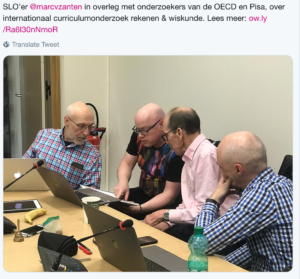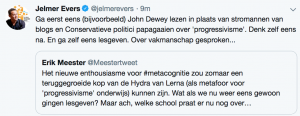April 2020, corona times, as you can hear from my voice: youtu.be/r63K9u3HKAU
The final frontier: August 16, 1999 – present, from higher goals to even bigger missions, these are the continuing voyages of the Freudenthal group and @SLO_nl towards @curriculum_nu.
The story in Dutch:
www.beteronderwijsnederland.nl/blogs/2016/12/waar-staan-we-nu-met-het-reken-en-wiskundeonderwijs/
This summer, on the 28th of July, it will be 10 (?) years ago, that the term #eduquacks was coined by twitter.com/P_A_Kirschner as refering to quite a few self-proclaimed educational experts. Way back, at the turn of the millennium, the NVvW (the Dutch Association of Math Teachers) had renewed its confession to Realistic Maths Education. Subsequently the reign of RME in the Netherlands became absolute, not only in primary but also in secondary education. In their own words:
www.staff.science.uu.nl/~heuve108/download-rme/VdHeuvel-Drijvers_2014_ENCYCLOPEDIA_RME-ref.pdf
Oops, that’s a dead end link, good. Is the Freudental Institute cleaning up? Let’s see, does
www.fisme.science.uu.nl/staff/marjah/download/VdHeuvel-Panhuizen_keynote_MERGA33co.pdf
still work? Yes. Utrecht University still has this paper in which the TAL professor discusses the opponents of RME (who) have as their leader, a professor in mathematics, who used to teach at a military academy. So no, they are not cleaning up. For the history in their own words this link still works:
www.icrme.net/uploads/1/0/9/8/109819470/rme_encyclopaediamathed.pdf
This PISA piece shows how the story continued and continues. Rekenen (arithmetic) and wiskunde (mathematics) merged into “realistic” rekenen-wiskunde, reform math if you like, and the PISA test pyramid was to guide us in our journey to the future forever. It might be argued that PISA goes way back to Katwijk, a famous village on the Dutch coast where this guy actually started his career as a highschool teacher:
It was in fact thanks to the appeal this Freudenthal Institute director-professor had at the time, that Dutch reform math became an international standard (PISA) for mathematics with the OECD. Even if you do not read Dutch, section 2 in repliekopmeer clearly indicates what RME experts have in mind when they talk about wiskunde. Or rather, what they don’t have in mind: mathematics. What they did have in their minds became Dutch law: stb-2010-265 is of particular interest, pages 26-47 concern “rekenen”. By the grace of God (page 1), and by the virtue of our professors in education, according to their perpetual rights. Nordic Walking appears on page 46.
How many members of Dutch parliament have ever read the nonsense they approved of? Nobody, I talked to most of them and got an honest answer from one. They believed the professors:
www.beteronderwijsnederland.nl/blogs/2011/09/diederik-stapel-een-van-de-achttien/
One of the professors signing this letter was Diederik Stapel. Since his fall from academia he has paid deerly, the others, most of them eduquackademics, are still being appointed in the usual committees installed by the Dutch ministry of education.
Of course these issues also relate to the new exam programmes for mathematics in the Netherlands, which, after 10 years of manipulations by and in cTWO (our Dutch committee for the future of math education), are now being implemented by SLO (our Dutch foundation for curriculum development).
The so-called authentic contexts and mathematical thinking activities are subject of debate. Are the contexts indeed authentic, and are they suited as didactical means for teaching/learning math? And what do we think about? Math or contexts? What do we learn when we think? Who guide us in our thinking? Can all this lead to something that makes children learn math, if that is still the intention?
Unfortunately there is no ground for such a discussion. Why not? Because the examples of contexts and directions for thinking activities presented by the group of experts implementing this reform math are usually flawed. And these flaws are in full accordance with Dutch law, Staatsblad 2010 265.
In case you do not read Dutch, it explains for instance how the price of a combined order of gevulde koeken (one of our Dutch health products) and cups of coffee is to be calculated using spreadsheets, under the realistic assumption that both koeken en koffie are priced 1,90 Euro each. Priceless.
Implemented in elementary school, progressing further and more deeply into secundary school as we speak. Sad-eyed stories from the lowlands as @curriculum_nu continues. Comments often disabled and @SLO_nl in charge.
www.beteronderwijsnederland.nl/blogs/2018/12/comments-disabled/

www.beteronderwijsnederland.nl/blogs/2021/04/bobos-en-bedriegers/
References
The ideology behind all this is of course well established in Dutch academy, as e.g. this thesis and references therein show:
This unscientific thesis is a key reference in the presentation of our new curricula for mathematics, see WDAgoogle. Others before me have observed, bragged and effectively shown that the ideology in this thesis is a Dutch export product:
www.gecijferdheid.nl/Publicaties/Villa_Onderwijs_Interview_Kees_Hoogland.pdf
www.fisme.science.uu.nl/staff/marjah/download/VdHeuvel-Panhuizen_keynote_MERGA33co.pdf
More about PISA (in Dutch) and RME:
benwilbrink.nl/projecten/pisa.htm
Via the last link I also found this important vision document PISAvision. It explains the ideology. 6 years later PISA and RME are going strong as ever. Wilbrink did not spend much time on reading the TAL series though. TAL was instrumental for the complete and total implementation of reform math in The Netherlands, beginning in elementary school, and set out for all of the math curriculum, upto the end of secundary school, with devastating consequences:
www.beteronderwijsnederland.nl/content/panama2015
More on reform math here:
paul-bruno.com/2014/08/reform-math-went-poorly-in-quebec/
Meanwhile in the States:
www.npr.org/blogs/ed/2014/12/29/371918272/the-man-behind-common-core-math
More in Dutch:
www.beteronderwijsnederland.nl/content/creativiteit-en-ict-wetenschap-en-praktijk
And have a look at
www.beteronderwijsnederland.nl/blogs/2014/07/hoe-realistisch-is-de-nieuwe-pabo-rekentoetsgids/.
But then again, Stanford proves me wrong of course:
web.stanford.edu/group/redlab/cgi-bin/materials/Kwek-Innovation%20In%20The%20Classroom.pdf.
For a pseudo-science case study, also in Dutch, look here:
www.beteronderwijsnederland.nl/nieuws/karin-den-heijer-over-pseudowetenschap.
—————————————————–
This blog was written long before #Schnabel2032 and all that. The author does not acknowledge the prog-trad dichotomy. Neither does he understand what the “Dutch variant of the Govean hyaena pack that is after the progressives” refers to. Or the Hirsch/knowledge crowd for that matter. Let alone the red brigades and the narrow and disingenuous that are actually pushing DI linked to knowledge as the sole solution to what ails education. The author does know one of the people referred to in a certain Red Brigades tweet.


Yours truly, www.beteronderwijsnederland.nl/blogs/2019/01/onuitroeibaar/

Leerlingen lastig vallen met
Leerlingen lastig vallen met WDA
JosTolboom (Curriculumontwerper wiskunde bij SLO) houdt zich bezig met wiskundige denkactiviteiten (WDA). Als voorbeeld van een opdracht voor leerlingen:
”Wat moet er in de hoofden van leerlingen gebeuren als je vraagt of wapenbezit gevaarlijk is of niet? Om een onderbouwd antwoord te kunnen geven, moet een leerling data verzamelen en daarmee gaan rekenen. Bijvoorbeeld de verkoopcijfers van wapens, het aantal gepleegde moorden, het aantal vuurwapens per hoofd van de bevolking in de USA versus het aantal in Finland enzovoort. Wanneer mag je, wiskundig gezien, tevreden zijn met een antwoord?"
Ben ik blij dat ik me vroeger niet hoefde bezig te houden met dit soort vraagstukken. Waarom zou het leerlingen moeten interesseren? Ze snappen heus wel dat experts hierover analyses en berekeningen kunnen geven, leerlingen hoeven toch niet op alle mogelijke gebieden hun wiskundekennis toe te passen?
Wie later wiskunde moet gebruiken in het bedrijfsleven krijgt daarvoor specialistische cursussen. Iemand die zich b.v. bezig gaat houden met data-security en codering zal zich daar vooraf in moeten verdiepen, te beginnen met het verwerven van kennis. Lessen in 21-st century skills op school zijn hier nutteloos.
Bron: http://www.wisactueel
Bron: www.wisactueel.nl/docs/wisactueel_files/wis_2013-3_act_leergang.pdf .
De bewering dat je zonder een
De bewering dat je zonder een fundament op te bouwen goed gebruik leert maken van wiskunde door van toepassing naar toepassing te gaan is net zo dwaas als te zeggen dat niemand een samenhangende kennis hoeft op te bouwen omdat je alles kunt vinden op het internet. Beide misvattingen passen samen heel goed in het nieuwe leren.
Opvallend is dat elke keer het idee terugkomt dat een vak pas interessant is als je het onmiddellijk praktisch toe kunt passen. Het doorzien van abstracte structuren en het oplossen van een abstract probleem is voor mensen die de smaak te pakken hebben gekregen zeker zo leuk.
Singapoer is land dat het in heel veel opzichten zeer goed doet, ook economisch. Dat zou kunnen helpen om steun van niet-wiskundelievende burgers te krijgen voor een voorstel dat leerlingen in het secundair onderwijs voor dat programma mogen te kiezen i.p.v. dat ze de Fraudentalwiskunde voorgeschrijven krijgen.
De Amerikanen mogen volgens
De Amerikanen mogen volgens hun grondwet in hun land vuurwapens hebben om zich te verdedigen, o.a. voor het geval de Engelsen zouden proberen om hun oude kolonie terug te veroveren. Alle onfhankelijke deskundigen zijn het er over eens dat de Amerikaanse burger veel veiliger zou leven als er nauwelijks wapens onder de burgers zijn. Het lukt ze echter niet om de kiezer daarvan te overtuigen en dat komt omdat we hier met een sociaal-psychisch problem te maken hebben. Natuurlijk hebben de deskundigen ook aan het probleem gerekend maar het merendeel van de kiezers blijft eigenwijs en gaat op zijn gevoel af. Jos Tolboom heeft als rekenobject een probleem gekozen waarvoor in extremo geldt dat het niet langs wiskundige weg kan worden opgelost.
Het is Hans Freudenthal maar
Het is Hans Freudenthal maar FRAUDEnTALwiskunde is een grappige verschrijving, gezien:
www.beteronderwijsnederland.nl/forum/de-hbo-raad-kennisbasesfraude-beeld
www.few.vu.nl/~jhulshof/TAL.pdf
HF was een geweldige wiskundige, daar niet van.
Van dezelfde firma:
Van dezelfde firma:
www.beteronderwijsnederland.nl/content/het-epsilon-handboek-voor-de-didactiek-van-de-wiskunde
Nieuwe link: www.beteronderwijsnederland.nl/blogs/2015/12/het-epsilon-handboek-voor-de-didactiek-van-de-wiskunde/. Jammer dat bij de migratie de links niet bijgewerkt zijn.
De volgende fase. Allemaal in
De volgende fase. Allemaal in de krant van Schnabeltjesland: no #eduquack left behind: www.didactiefonline.nl/47-uncategorised/12649-reken-en-wiskundeonderwijs-voor-2032
Ook die link is veranderd. Nu is het didactiefonline.nl/blog/blonz/reken-en-wiskundeonderwijs-voor-2032, waarom Marreveld dit besloot te plaatsen is me een raadsel. Ik heb 3 uur met haar gesproken. Ben even kwijt of dat er voor of er na was. Mocht het ervoor zijn geweest dan verbaas ik me dat ze het niet genoemd heeft want alle namen zijn wel langsgekomen in dat gesprek. Dit zijn deze ze dus, de quasi-experts. Alleen Hoogland ontbreekt.
Onder nivoz.nl/nl/inaugurele-rede-rob-martens-onderwijsonderzoek-en-de-relatie-met-de-praktijk heb ik wat comments gezet in verband met @leraar24 en de RR-CGO kennisbasis rekenen voor de pabo. Het Ruud de Moor Center (later Look) van @profrobmartens had hierbij een belangrijke rol. En het gaat maar door allemaal. Zie bijvoorbeeld www.leraar24.nl/207840/divergerende-denkstijlen/.
Ik zie dat www.leraar24.nl/207840/divergerende-denkstijlen/ doodloopt maar ik vond wel dit: www.leraar24.nl/app/uploads/Groepsdynamica_Cooperatiefleren.pdf.